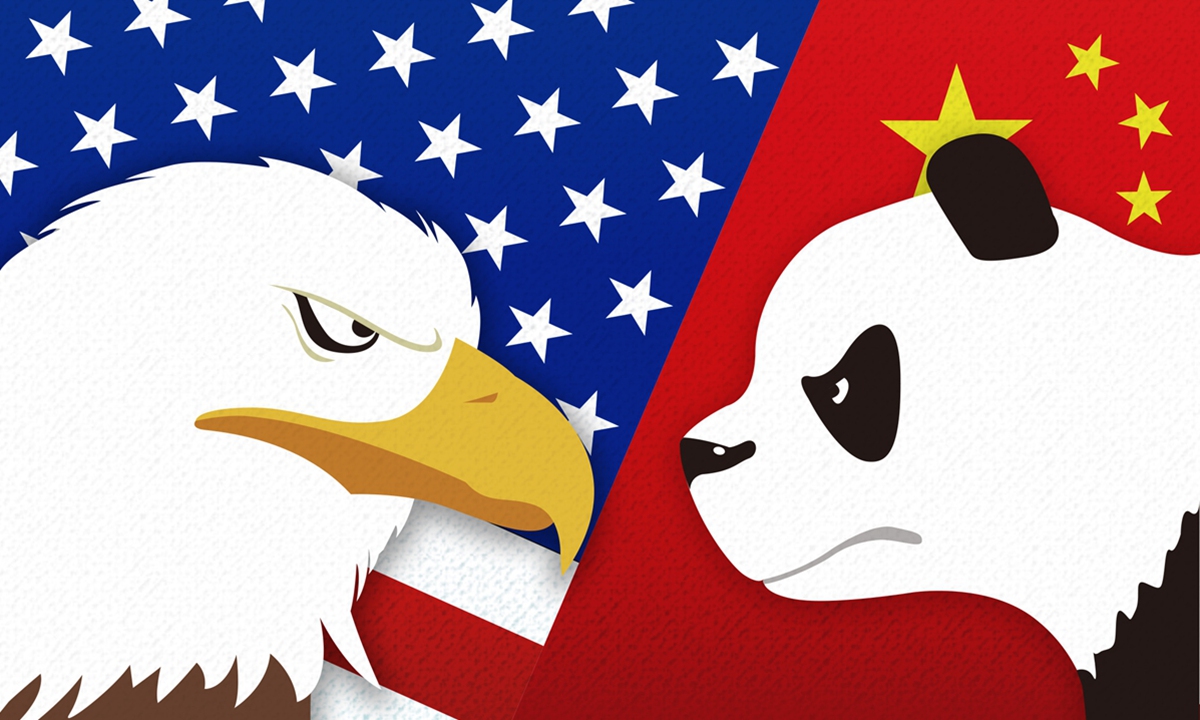
China US Illustration: Liu Rui
The Ukraine crisis has entered fourth week. Although Russia and Ukraine have held four rounds of dialogue, the prospect of a quick ceasefire and diplomatic settlement through negotiations does not seem likely in the short term. The crisis is not only about the conflict between Russia and Ukraine, but also reflects the historic collapse of the security order in the European continent since the end of the Cold War.
The Ukraine crisis is causing a humanitarian crisis, a refugee crisis that has spread to Europe, along with a possible nuclear power plant leak, and a possible biological virus leak from US biolabs in Ukraine. Continuing military conflicts and confrontations may result in more civilian casualties. If the US and European countries continue to support the Ukrainian military in an all-out war against the Russian army, an escalation of the conflict cannot be ruled out.
In this context, Chinese President Xi Jinping said during a video call with US President Joe Biden that China and the US must "not only guide their relations forward along the right track, but also shoulder their share of international responsibilities and work for world peace and tranquility."
Since the outbreak of the crisis, China's position has been coherent and consistent. We firmly uphold the principles of the UN Charter and explicitly oppose the settlement of disputes through war and confrontation. We insist that legitimate concerns of both sides based on the merits of the Ukraine issue should be accommodated.
In a telephone conversation with Russian President Vladimir Putin on February 25, President Xi proposed to seek the construction of a balanced, effective and sustainable European security mechanism through negotiations and to resolutely safeguard the UN-centered international system and the international order underpinned by international law. China so far has provided three batches of humanitarian supplies to Ukraine, reflecting China's humanitarianism and providing assistance to the war-affected Ukrainian people in a timely manner.
The nature of the military conflict in Ukraine is similar to that of the Korean and Vietnam wars in East Asia during the Cold War. All are "proxy" wars stemming from major powers' geostrategies. The Korean and Vietnam wars deepened the Cold War rivalry in Asia, intensifying hostility, division and confrontation among the countries concerned.
Today, China rejects a new cold war. We need to be on high alert and guard against a new animosity and confrontation that arise from the deepening of the Ukraine crisis. There is a major strategic need for China to maintain an international environment for peaceful development, accelerate its global integration and ensure sustainable economic growth.
Going forward, China and the US will remain in a period of tough competition. However, the overall strategic situation cannot be changed. China and the US, as the world's two largest economies and permanent members of the UN Security Council, cannot turn a blind eye to the profound significance of jointly preventing the situation in Ukraine from getting out of control. Together, they must seek to prevent the deepening of the humanitarian crisis in Ukraine, and control the negative impact caused by the crisis globally.
Principles, morality and credibility have always been paramount in China's diplomacy. Russia is China's comprehensive strategic partner of coordination in the new era. While opposing the use of war to resolve disputes, we firmly refuse to participate in sanctions against Russia. The frenzied sanctions by the US and the West will only intensify the confrontation within Europe. The US wants to bring in China to sanction and suppress Russia, which is not in line with the basic principles of China's diplomacy, and contrary to China's long-term commitment to maintaining friendly relations with Russia.
China is unlikely to help Russia take military actions against Ukraine. China and the US can strengthen great power coordination on the Ukraine issue, promote peace talks, accelerate the ceasefire and avoid the breakup of global politics. The Biden administration needs to agree with China's bottom line policy. The easing and ending of the Ukraine crisis can provide the impetus for deepening China-US cooperation and managing bilateral differences.
The author is a professor of international relations at Nanjing University. opinion@globaltimes.com.cn




